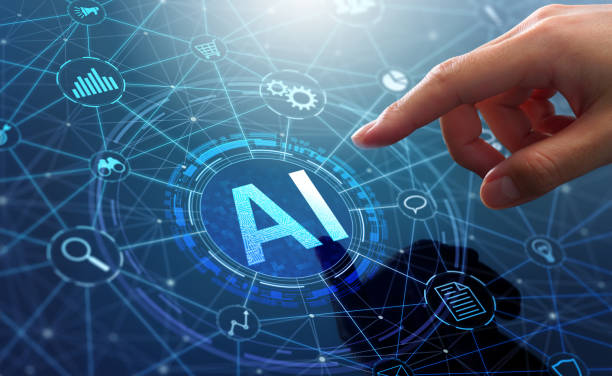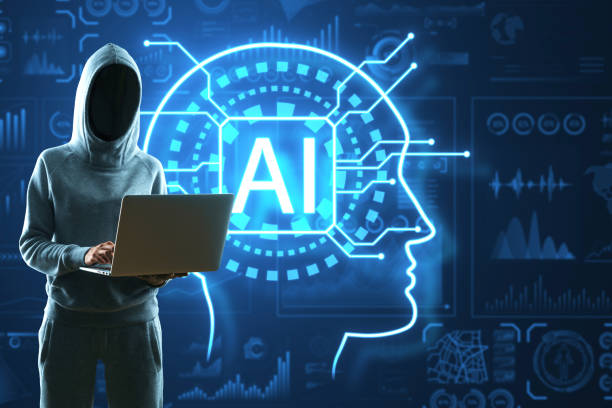What is Artificial Intelligence and How Does It Work?
#Artificial_Intelligence (AI) is a branch of computer science that deals with building machines capable of performing tasks that typically require human intelligence.
These tasks include learning, reasoning, problem-solving, understanding natural language, and pattern recognition.
Artificial intelligence encompasses a wide range of techniques, including machine learning, deep neural networks, natural language processing, and computer vision.
The basis of artificial intelligence lies in algorithms and mathematical models that allow machines to learn from data, identify patterns, and make decisions.
Machine learning, as a subset of artificial intelligence, allows machines to improve from their experiences without explicit programming.
Neural networks, inspired by the structure of the human brain, are complex models capable of learning complex patterns in data.
Natural Language Processing (NLP) enables machines to understand and generate human language.
This technique is used in applications such as machine translation, chatbots, and sentiment analysis.
Computer vision allows machines to understand images and videos and recognize objects, faces, and scenes.
Artificial intelligence is constantly evolving and its applications are expanding.
From self-driving cars and medical diagnosis to customer service and marketing, artificial intelligence is transforming various industries.
More information about artificial intelligence on Wikipedia.
Disappointed with the low conversion rate of your online store? Rasaweb will turn your online store into a powerful tool for attracting and converting customers!
✅ Significant increase in visitor-to-buyer conversion rate
✅ Unparalleled user experience to increase customer satisfaction and loyalty⚡ Get free consultation from Rasaweb!
Types of Artificial Intelligence – From Narrow to Super
Artificial intelligence can be categorized into different types based on their abilities and capabilities.
One of the most common classifications is dividing artificial intelligence into two main categories: Narrow AI and General AI.
Narrow AI, also known as weak AI, is designed to perform a specific task and performs well in that area.
Examples of narrow AI include facial recognition systems, email spam filters, and product recommendation systems.
These systems are very efficient in their specialized field, but they cannot perform tasks for which they have not been trained.
Click here to preview your posts with PRO themes ››
General AI, also known as strong AI, has cognitive abilities similar to humans and can perform any task that a human is capable of.
General AI is still in the early stages of development and there is no complete general AI system.
There are many challenges on the path to achieving general AI, including developing more complex learning algorithms and collecting sufficient training data.
In addition to these two main categories, there is also Super AI, which surpasses human intelligence and can perform better than humans in any field.
Super AI is a hypothetical concept and currently no system with these capabilities exists.
However, rapid advancements in the field of artificial intelligence have led some scientists and researchers to believe in the possibility of realizing super AI in the not-too-distant future.
More information about types of artificial intelligence at IBM.
Machine Learning – The Beating Heart of Artificial Intelligence
Machine learning is one of the most important subsets of artificial intelligence that allows machines to learn from data without explicit programming.
In fact, machine learning allows machines to identify patterns and relationships in data using algorithms and statistical models, and use these patterns for prediction or decision-making.
Machine learning is widely used in various applications such as image recognition, natural language processing, data analysis, and product recommendation systems.
There are different types of machine learning algorithms, including Supervised Learning, Unsupervised Learning, and Reinforcement Learning.
In supervised learning, the machine is trained using labeled data, which means that the training data includes the input and the desired output.
The machine tries to learn a relationship between the input and output and uses this relationship to predict the output for new inputs.
In unsupervised learning, the machine is trained using unlabeled data, which means that the training data only includes the input.
The machine tries to identify hidden patterns and structures in the data and uses these patterns to group the data or reduce the dimensions of the data.
Click here to preview your posts with PRO themes ››
In reinforcement learning, the machine is trained using trial and error.
The machine is placed in an interactive environment and receives rewards or penalties for performing various actions.
The machine tries to learn a strategy that achieves the most rewards over time.
| Algorithm | Type of Learning | Applications |
|---|---|---|
| Linear Regression | Supervised | Predicting housing prices |
| K-means Clustering | Unsupervised | Customer segmentation |
| Deep Learning | Supervised/Unsupervised | Image recognition, natural language processing |
More information about machine learning on Google Developers.
Applications of Artificial Intelligence in Various Industries
Artificial intelligence is currently used in various industries and has a significant impact on how things are done.
In the healthcare industry, artificial intelligence is used for disease diagnosis, drug development, providing personalized care, and managing hospitals.
For example, artificial intelligence systems can analyze medical images and detect anomalies that may be difficult for human doctors to detect.
In the financial industry, artificial intelligence is used for fraud detection, risk management, customer service, and automated trading.
For example, artificial intelligence algorithms can identify suspicious patterns in financial transactions and prevent fraud.
In the manufacturing industry, artificial intelligence is used for process automation, quality control, equipment failure prediction, and supply chain optimization.
For example, intelligent robots can perform repetitive and dangerous tasks on production lines.
In the transportation industry, artificial intelligence is used to develop self-driving cars, optimize routes, and manage traffic.
For example, self-driving cars can understand their surroundings and drive without human intervention using sensors and artificial intelligence algorithms.
In addition to these industries, artificial intelligence is also used in other areas such as education, marketing, entertainment, and security.
For example, intelligent educational systems can adapt educational content to the individual needs of students and provide a better learning experience.
More information about the applications of artificial intelligence at Oracle.
Are you annoyed by losing customers due to the old appearance or slow speed of your online store? The specialized Rasaweb team solves these problems with professional online store design!
✅ Increase customer trust and brand credibility
✅ Blazing speed and excellent user experience
Get a free consultation with Rasaweb now ⚡
Challenges and Limitations of Artificial Intelligence
Despite the high potential of artificial intelligence, this technology also faces many challenges and limitations.
One of the most important challenges is the need for large amounts of high-quality training data.
Machine learning algorithms require a large amount of labeled data to learn effectively.
Collecting and labeling this data can be time-consuming and costly.
Also, if the training data is biased, artificial intelligence systems can also become biased and produce unfair results.
Another challenge is the lack of interpretability of artificial intelligence models.
Many deep learning models, such as deep neural networks, are very complex and it is difficult to understand how they make decisions.
This can reduce trust in artificial intelligence systems, especially in areas where important decisions are made, such as medical diagnosis or legal judgment.
Ethical issues are also an important challenge in the field of artificial intelligence.
The use of artificial intelligence can lead to job losses, privacy violations, and discrimination.
For example, the use of facial recognition systems can lead to violations of people’s privacy.
Also, the use of artificial intelligence algorithms in hiring can lead to discrimination against certain groups.
Finally, the security of artificial intelligence systems is also a major concern.
Artificial intelligence systems can be vulnerable to cyber attacks and manipulation.
This can lead to incorrect and harmful decisions.
More information about the challenges of artificial intelligence at Brookings.
The Future of Artificial Intelligence – Prospects and Possibilities
The future of artificial intelligence is very bright and full of possibilities.
Rapid advances in this field indicate that artificial intelligence will play a much more important role in our lives in the future.
Artificial intelligence is expected to create fundamental changes in various fields such as healthcare, education, transportation, manufacturing, and customer service.
One of the most important trends in the future of artificial intelligence is the development of general artificial intelligence.
Although there are still many challenges on the path to achieving general artificial intelligence, researchers and scientists are constantly working to develop more advanced learning algorithms and models that are capable of imitating human intelligence.
Artificial intelligence is expected to be more integrated with other technologies such as the Internet of Things (IoT), cloud computing, and blockchain in the future.
This integration can lead to the creation of smarter and more efficient systems that are capable of solving complex problems and providing innovative services.
However, it should be noted that the development of artificial intelligence also requires attention to ethical and social issues.
It must be ensured that artificial intelligence is used fairly and responsibly and does not violate the rights and privacy of individuals.
More information about the future of artificial intelligence at MIT News.
Artificial Intelligence and its Impact on the Labor Market
Artificial intelligence will have a significant impact on the labor market.
The automation of processes and tasks by artificial intelligence systems can lead to the loss of some jobs, especially jobs that involve repetitive and routine tasks.
However, artificial intelligence can also create new job opportunities, especially in areas such as artificial intelligence development, data analysis, robotics engineering, and data science.
Demand for artificial intelligence professionals is expected to increase significantly in the coming years.
In order for people to succeed in the future labor market, they must learn new skills that are adapted to new needs.
Skills such as critical thinking, problem-solving, creativity, communication, and technical skills related to artificial intelligence will become more important.
Also, people must be prepared to learn continuously and update their skills.
Governments and educational organizations also play an important role in preparing the workforce for the changes caused by artificial intelligence.
New educational and apprenticeship programs should be created that familiarize people with the skills needed for future jobs.
Also, policies should be adopted that protect people from job losses due to automation.
More information about the impact of artificial intelligence on the labor market at the World Economic Forum.
| Job | Description | Impact of Artificial Intelligence |
|---|---|---|
| Truck Driver | Transportation of goods | Likely to be replaced by self-driving cars |
| Data Analyst | Analyzing data for decision-making | Increased demand |
| Artificial Intelligence Specialist | Development and implementation of artificial intelligence systems | Increased demand |
Ethical Issues in Artificial Intelligence – Accountability and Transparency
The use of artificial intelligence is associated with many ethical issues that require careful attention and consideration.
One of the most important issues is accountability.
If an artificial intelligence system makes a mistake and causes harm, who is responsible? Is the developer, manufacturer, or user responsible? Determining accountability in these cases can be difficult.
Transparency is also another important ethical issue.
It must be ensured that the decision-making process of artificial intelligence systems is understandable and explainable.
This can increase trust in artificial intelligence systems and prevent unfair and discriminatory decisions.
Privacy is also a major concern.
Artificial intelligence systems often require large amounts of personal data.
It must be ensured that this data is collected, stored, and used securely and responsibly and does not violate the privacy of individuals.
In addition, the impact of artificial intelligence on social equality and justice should also be considered.
It must be ensured that artificial intelligence is fairly accessible to everyone and does not lead to discrimination against certain groups.
More information about ethical issues of artificial intelligence at MIT AI Ethics.
Are you tired of losing business opportunities due to the lack of a professional corporate website?
Rasaweb helps you by designing a professional corporate website:
✅ Build a powerful and reliable image of your brand
✅ Turn website visitors into loyal customers
⚡ Get a free consultation now!
How to Learn Artificial Intelligence? – Learning Resources and Paths
If you are interested in learning artificial intelligence, there are various learning resources and paths available to you.
You can improve your knowledge and skills in this field by attending online courses, reading books and articles, attending workshops and conferences, and working on practical projects.
Some of the most popular online artificial intelligence courses are those offered by Coursera, edX, and Udacity.
These courses cover a wide range of topics, including machine learning, deep neural networks, natural language processing, and computer vision.
Books and articles can also be valuable resources for learning artificial intelligence.
Some of the popular books in this field include “Machine Learning with Python” by Sebastian Raschka and “Artificial Intelligence – A Modern Approach” by Stuart Russell and Peter Norvig.
Attending workshops and conferences can be a good opportunity to learn from experts and network with other artificial intelligence enthusiasts.
Some of the important conferences in this field include NeurIPS, ICML, and ICLR.
Working on practical projects can help you put your knowledge and skills into practice.
You can gain practical experience by participating in machine learning competitions, contributing to open-source projects, or creating personal projects.
More information about learning artificial intelligence at DataCamp.
Artificial Intelligence in Iran – Current Status and Potentials
Artificial intelligence is also developing in Iran and has great potential for growth.
Several universities and research centers in Iran are active in the field of artificial intelligence and conduct various research in this field.
Also, several startups in Iran are active in the field of artificial intelligence and offer innovative products and services.
The Iranian government also pays special attention to the development of artificial intelligence and implements several programs to support this technology.
The goal of the Iranian government is to become one of the leading countries in the field of artificial intelligence in the region.
However, the development of artificial intelligence in Iran also faces challenges.
One of the most important challenges is the shortage of specialists.
For the development of artificial intelligence in Iran, there is a need to train specialized and skilled personnel in this field.
Also, there is a need for more investment in research and development of artificial intelligence.
Despite these challenges, there is great potential for the development of artificial intelligence in Iran.
Iran has a young and educated workforce and has access to large amounts of data.
Given these potentials, it can be hoped that Iran will play an important role in the development and application of artificial intelligence in the region and the world in the future.
Currently, there is no accurate information about the status of artificial intelligence in Iran available in reliable sources.
Frequently Asked Questions
| Question | Answer |
|---|---|
| 1. What is Artificial Intelligence (AI)? | It is a branch of computer science that aims to create machines capable of simulating human intelligence and performing tasks that require human thinking, such as learning, problem solving, and decision making. |
| 2. What are the main types of Artificial Intelligence? | They can be classified into weak artificial intelligence (Narrow AI) which focuses on a specific task, general artificial intelligence (General AI) which possesses comprehensive human capabilities, and super artificial intelligence (Super AI) which surpasses human intelligence. |
| 3. Mention some common applications of Artificial Intelligence in our daily lives. | They include voice assistants (such as Siri and Alexa), recommendation systems (such as Netflix and Amazon), self-driving cars, facial recognition systems, and spam filters. |
| 4. What is the difference between Artificial Intelligence and Machine Learning (Machine Learning)? | Artificial Intelligence is the broader concept of creating intelligent machines, while Machine Learning is a subset of Artificial Intelligence that focuses on enabling systems to learn from data without explicit programming. |
| 5. What is Deep Learning? | It is a subset of machine learning that uses multilayer artificial neural networks (deep neural networks) to process data and discover complex patterns, and is used in image and speech recognition. |
| 6. What are the most prominent benefits of Artificial Intelligence? | Improving efficiency and productivity, automating repetitive tasks, making better decisions based on big data analysis, and developing solutions to complex problems in fields such as medicine and science. |
| 7. What are the main challenges facing the development and deployment of Artificial Intelligence? | They include the need for massive amounts of high-quality data, privacy and security issues, bias in data and algorithms, and high development and maintenance costs. |
| 8. Does Artificial Intelligence raise ethical or social concerns? | Yes, it raises concerns about privacy, algorithmic bias, job losses due to automation, responsibility for errors committed by intelligent systems, and the need for a regulatory framework. |
| 9. How can Artificial Intelligence affect the future of the labor market? | It can lead to the automation of some routine jobs, but it will also create new jobs that require advanced skills in developing, operating, and maintaining Artificial Intelligence systems. |
| 10. What are some modern or promising technologies in the field of Artificial Intelligence? | They include advanced natural language processing (NLP) (such as large language models such as ChatGPT), computer vision, robotics, and generative AI (Generative AI). |
And other services of Rasa Web Advertising Agency in the field of advertising
Smart SEO: Transform the click-through rate with the help of attractive user interface design.
Smart customer journey map: A new service to increase SEO ranking improvement by customizing the user experience.
Smart customer journey map: A fast and efficient solution to increase website visits by focusing on marketing automation.
Smart UI/UX: A creative platform to improve customer behavior analysis with an attractive user interface design.
Smart SEO: A combination of creativity and technology for online growth by managing Google Ads.
And more than hundreds of other services in the field of internet advertising, advertising consulting and organizational solutions
Internet Advertising | Advertising Strategy | Advertisement Report
Resources
What is Analytical AI?
,What is Artificial Intelligence?
,Applications of Artificial Intelligence
,Artificial Intelligence (AI)
“`html
? In today’s fast-paced digital world, your powerful online presence is the key to success. Rasaweb Aferin, with its expertise in digital marketing, from professional corporate website design to search engine optimization, will be the communication bridge between your business and your audience.
“`
📍 Tehran, Mirdamad Street, next to the Central Bank, South Kazerun Alley, Ramin Alley No. 6
“`














